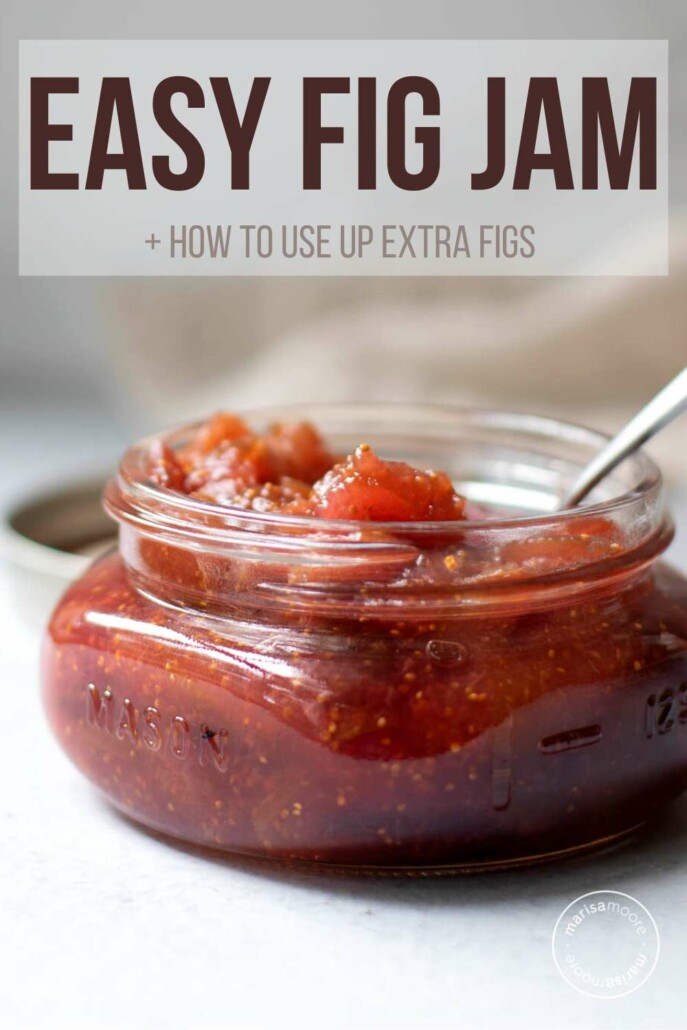This small batch fig jam recipe is a sweet and easy way to use up fresh figs before they go bad. With no pectin required, this easy jam is ready in minutes. It’s perfect on morning toast or yogurt and is a sweet complement to cheese in your holiday snack boards and spreads.
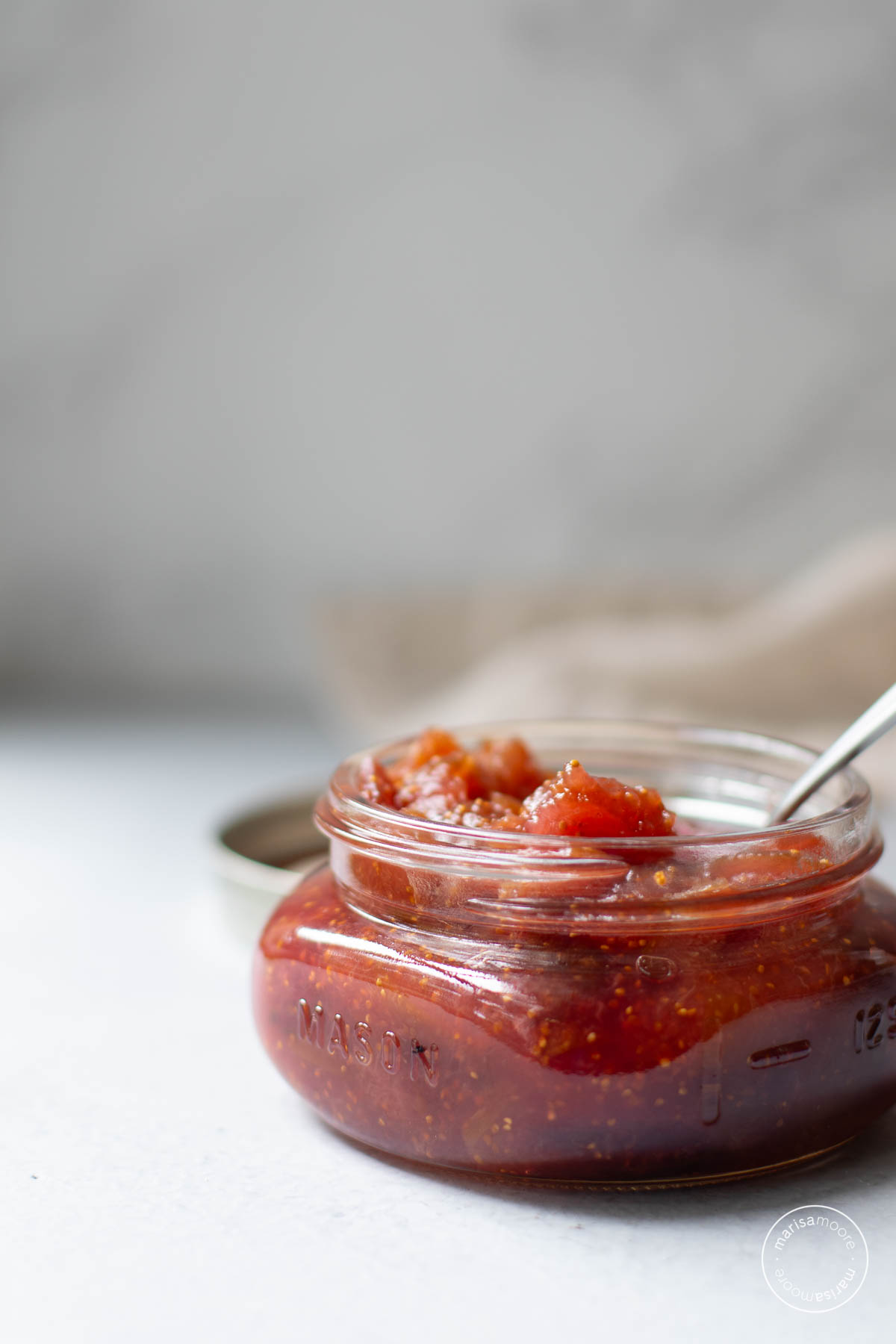
Learn how to make delicious homemade fig jam. Plus, get tips on which figs to use and storage tips in this guide all about making fig jam.
This sweet and versatile spread is perfect swirled into oats or warmed and spooned over pancakes or waffles. It’s also a great addition to baked goods and adds flavor and elegance to appetizers like my fig and goat cheese flatbread.
Fig jam is one of my favorite condiments to elevate a variety of different dishes. And if you think making your own jam is hard, it’s actually quite simple, especially with this easy refrigerator jam recipe.
Best figs for jam
The best types of figs to use for jam are sweet and juicy varieties with a soft skin. I used a mixture of mostly Black Mission and Kadota figs for this jam since I needed to use them up.
Here are some of the most popular ones:
- Black Mission: These figs are dark purple on the outside and have a deep red, honey-sweet flesh. They’re perfect for making jam because they hold their shape well and don’t become too mushy.
- Brown Turkey: These are light brown on the outside and have a sweet, slightly nutty flavor. They’re also a good choice for making jam because they’re relatively easy to find.
- Calimyrna: Calimyrna figs are golden brown on the outside and have a light amber-colored flesh. They’re known for their sweet, honeyed flavor and their delicate texture.
- Kadota: Kadota figs are green on the outside and have a light green flesh. They’re not as sweet as some other varieties of figs, but work well when mixed with sweeter ones. You can also use tiger figs in a mixed fig jam.
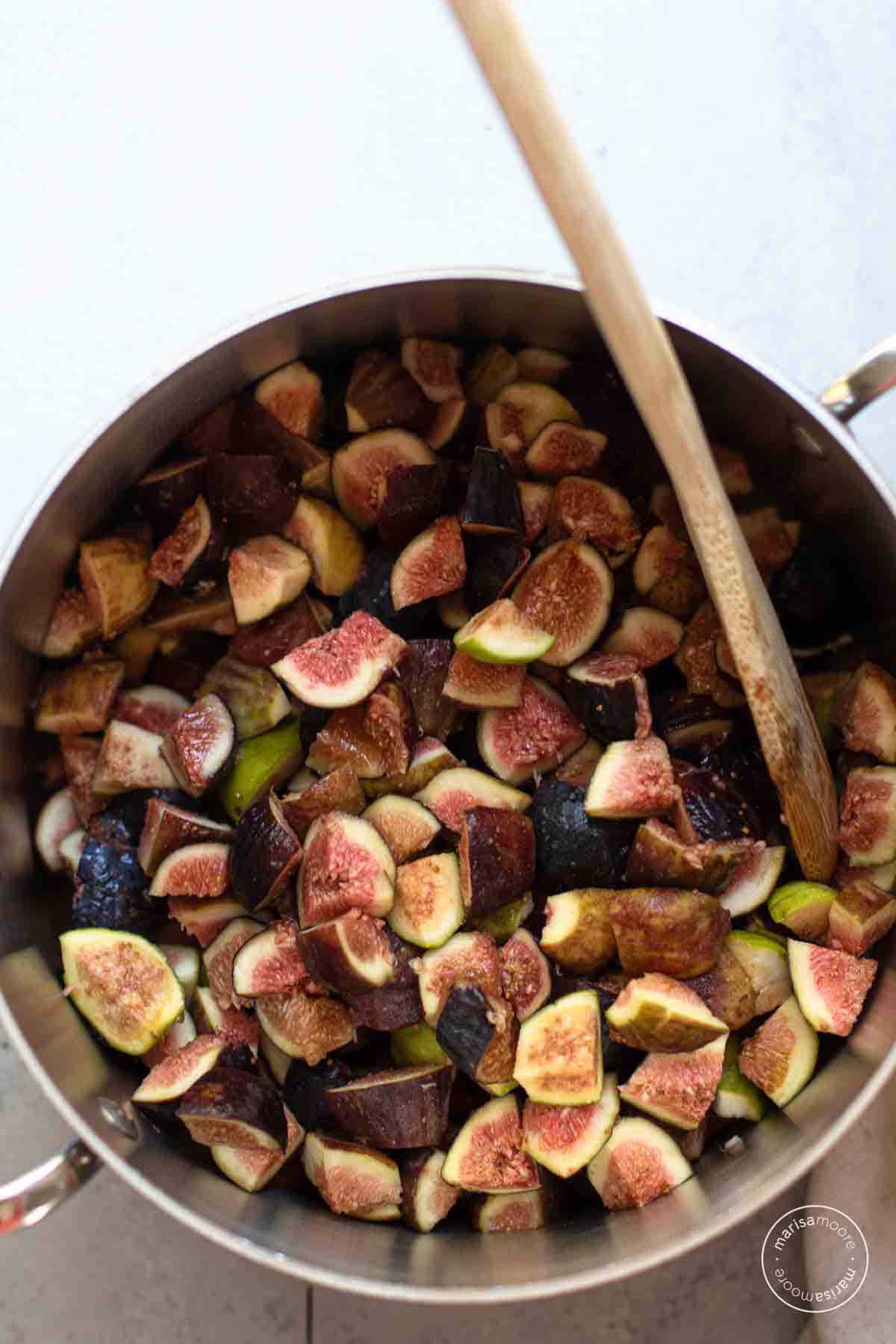
How to make fig jam
To make this refrigerator fig jam, you’ll need a medium saucepan – large enough to hold at least a pound of fresh figs. You’ll simply add the figs, sugar, water and lemon juice to the pot and cook it until the fruit softens and combines with the sugar and liquids into a jammy consistency.
This one is not shelf stable but it will last about 2 weeks in the fridge.
Tips for success
- Use ripe figs. The riper the figs, the sweeter the jam will be. Ripe figs also help provide the best texture.
- Adjust the sugar to your liking. Taste your figs first and adjust accordingly.
- Always stem the figs and slice the figs before adding to the saucepan. The smaller you cut the figs, the quicker the jam will form. I cut the figs into chunks not quarters.
- For a smoother jam, use a potato masher or puree the cooled down jam in a food processor before adding to jars.
- Be careful not to overcook the jam. If you cook the jam on too high heat or for too long, the sugars can burn and ruin the flavor of the jam.
- Let the jam cool completely before pouring it into jars.
Use up ripe figs
Fig jam is a great way to use up ripe figs. If you have too many figs to eat fresh, simply wash them, remove the stems, and quarter them. Make this jam and refrigerate or freeze the figs to make it later.
To freeze fresh figs: Place fresh stemmed and quartered figs in a single layer on a baking sheet until solid. Once frozen, transfer the figs to a freezer-safe bag or container and store for up to 6 months. When you’re ready to make jam, simply omit the water and follow the same directions for this recipe.
Do I need to peel the figs?
No. You do not need to peel the figs before making jam. The peels are actually a good source of nutrition so you’ll want to keep it. The skin will soften during the cooking process. It sort of melts right in and you won’t even notice it.
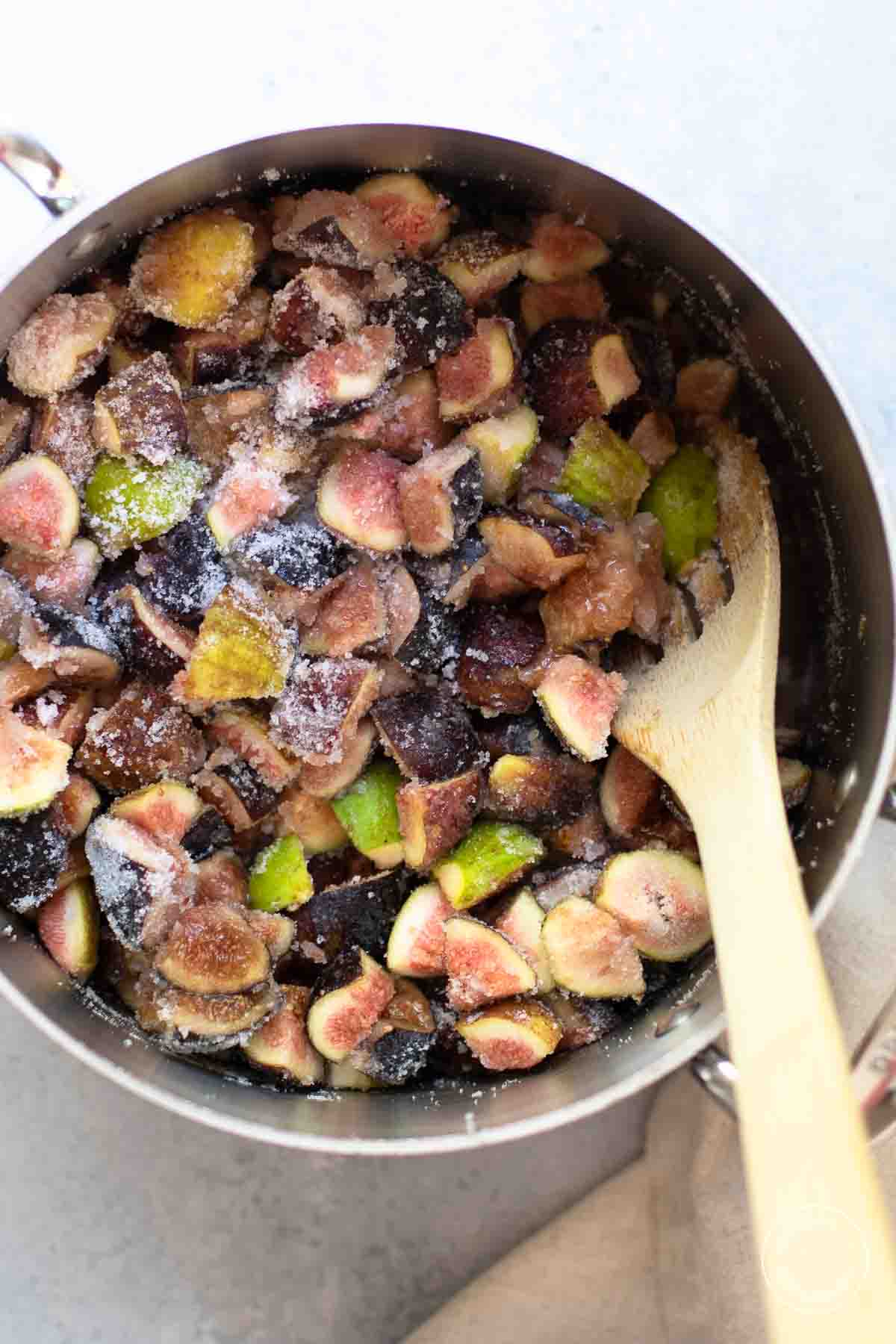
Can I make it without sugar?
Yes. You can make fig jam without sugar. You can use a sugar substitute, such as stevia or monk fruit sweetener, or you can omit the sugar altogether.
I But Ipersonally enjoy adding some sugar to jam. It helps enhance the natural sweetness of the fruit. I’ve created this recipe using only ½ cup sugar – which is significantly less than most jam recipes. Taste it to see if it’s sweet enough – then adjust up or down based on your taste preferences.
NOTE: No-sugar added jam is healthier. But it will not be as thick or as sweet if you do not use sugar. You may find that you’ll have to cook it longer and/or reduce the water in the recipe.
Substitutions and add-Ins
Figs pair well with many different wintery herbs and spices. Try adding a sprig of rosemary while the jam is cooking. Another great addition would be warm spices like ground ginger, cinnamon, star anise or a pinch of nutmeg.
Instead of lemon juice, swap in fresh orange juice. Or try a space of red wine or Grand Marnier cognac for extra flavor.
How do I know when the jam is done?
- Freezer test. To test if the jam is done, spoon a small amount onto a chilled plate. Let the jam cool for a few minutes, then tilt the plate. If the jam runs slowly, it’s done. If it runs too quickly, cook the jam for a few more minutes.
- Temperature check. After the jam comes to a boil, use a candy or instant read thermometer to check that it reaches 220°F (104°C). It’s at this point that the sugar and natural pectin can form a gel – which is just what you want. **Though it can work for small ones in small pots, this method is best for large batches of jam.
How long does fresh fig jam last?
Stored properly, the jam will last for up to 2 weeks in the refrigerator. You can also freeze it for up to 6 months.
To freeze the jam: Let the jam cool completely in the pot. Transfer to a freezer-safe container. It will keep for 4-6 months in the freezer.
When you’re ready to use it, let thaw in the refrigerator overnight. Freezer jam is perfect for making a fig compote, sauce or glaze to use in a variety of recipes.
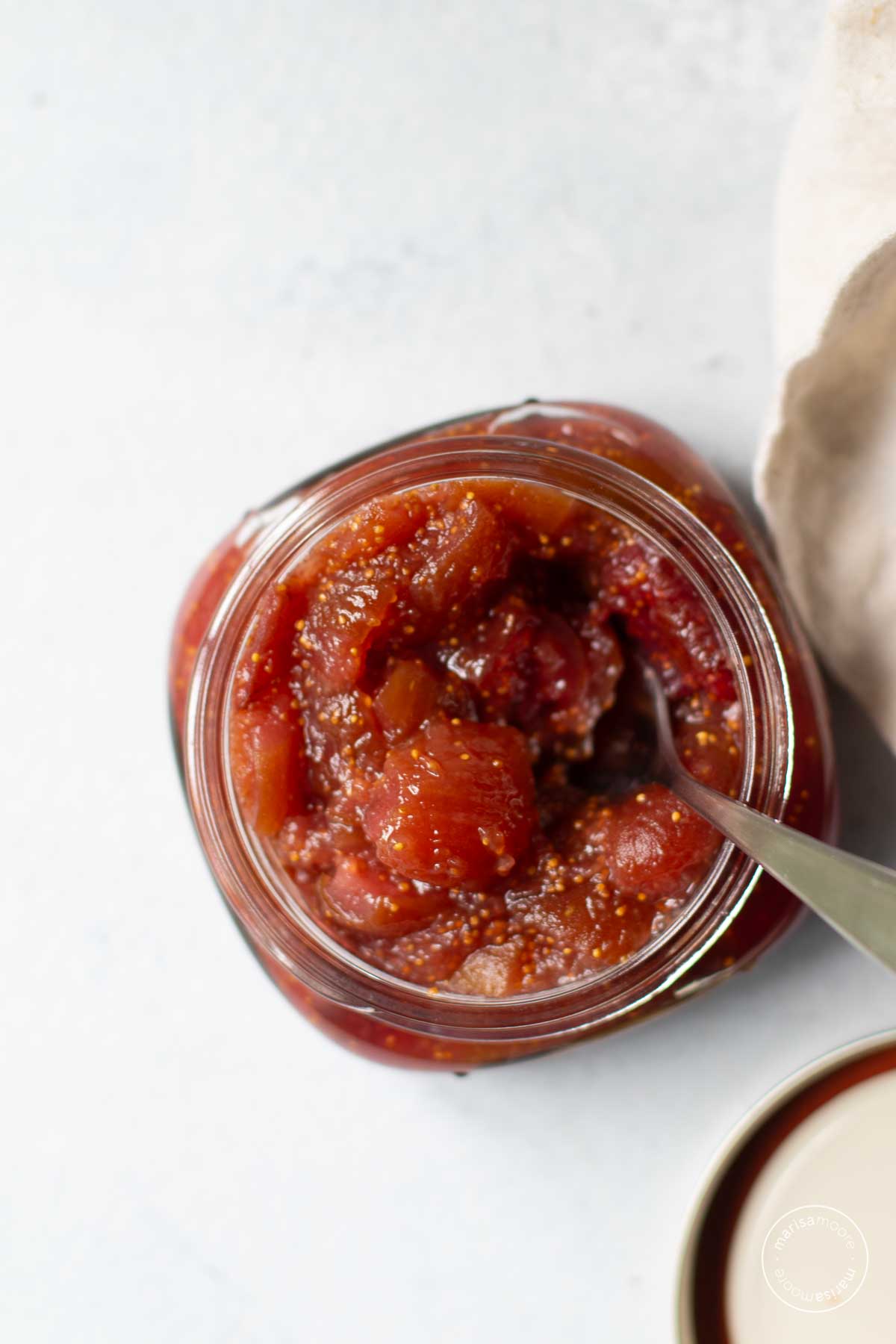
How can I use fig jam in recipes?
- Spread it on toast, pancakes, waffles, or muffins for a delicious breakfast or snack.
- Use it as a filling for croissants, pastries, and pies.
- Glaze tofu, chicken, salmon or pork with fig jam for a sweet and savory main dish.
- Add it to marinades and sauces for a unique flavor profile.
- Use it as a spread for cheese plates and charcuterie boards. It goes very well with manchego and goat cheeses.
- Heat it and drizzle onto pancakes or waffles.
- Stir it into yogurt, oatmeal, or granola for a healthy and satisfying breakfast.
- Use it to make a vinaigrette dressing for salads.
- Add it to cakes, muffins, and cookies for a moist and flavorful treat.
- Add it to cocktails and mocktails for a sweet and fruity flavor.
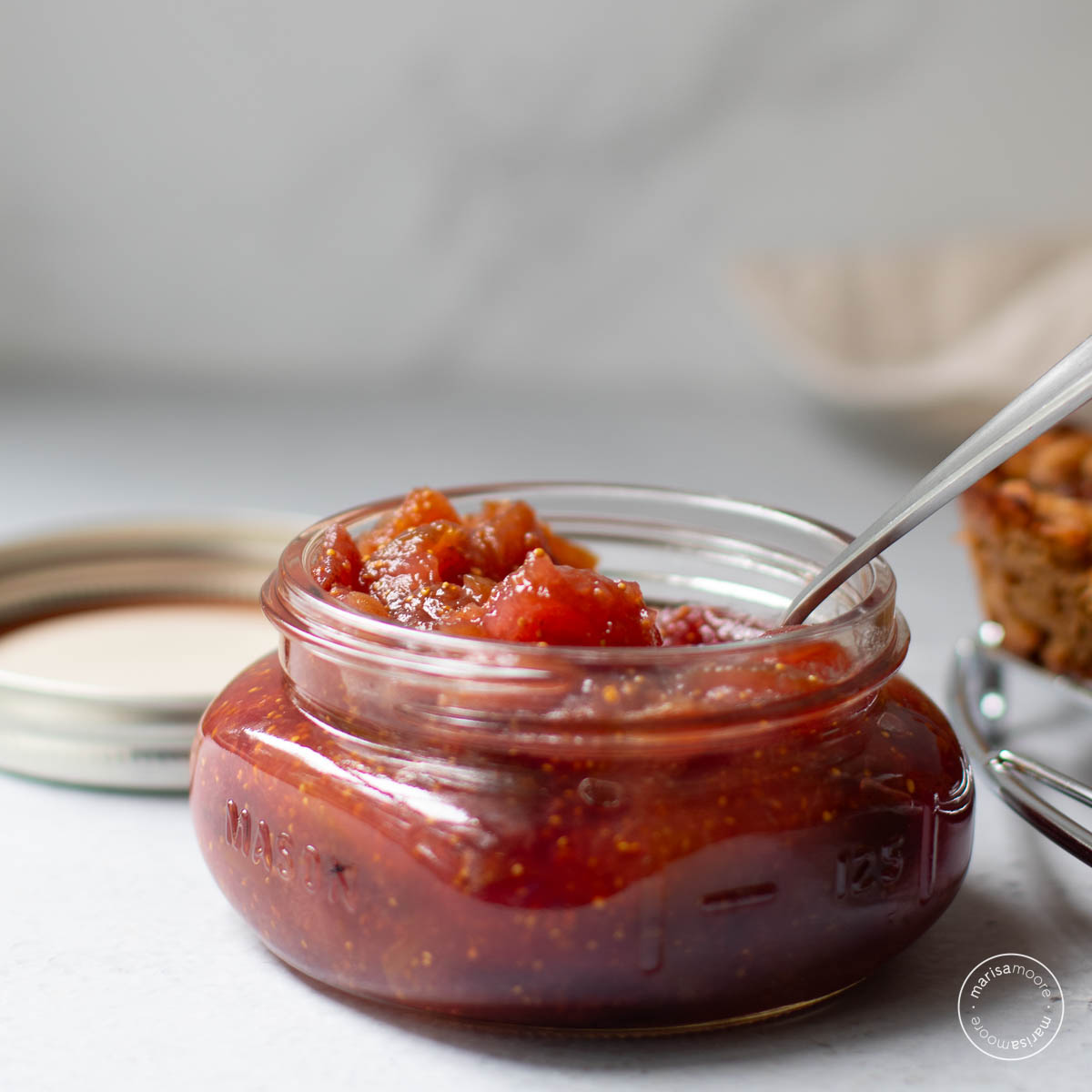
Here are some delicious mini recipe ideas:
Fig and goat cheese crostini: Toast baguette slices and spread with fig jam. Top with goat cheese, microgreens and a squeeze of balsamic glaze. Serve this simple appetizer for your next party, game night, or picnic.
Fig and prosciutto pizza: Spread a flatbread or pizza dough with fig jam and top with prosciutto, arugula, and shaved Parmesan cheese. Bake until the crust is golden brown and the cheese is melted and bubbly. Serve this salty, sweet, savory and sophisticated pizza for a light dinner with a salad or slice and serve as an appetizer.
No matter how you choose to use it, fig jam is a delicious and versatile ingredient that can add a touch of sweetness and sophistication to your dishes.
Other popular and easy refrigerator jam recipes to try include my juneberry jam and Instant Pot Peach Jam.
Easy Fig Jam
Use up leftover fresh fruit in this easy fig jam. With low sugar and great flavor this refrigerator fig jam is perfect for fall and holiday appetizer season.
Servings: 24 tablespoons
Calories: 30kcal
Ingredients
- 1 pound ripe fresh figs, stemmed and chopped
- ½ cup sugar
- ¼ cup water
- 2 tbsp lemon juice
Instructions
-
In a medium saucepan, combine the figs, sugar, water, and lemon juice. Bring the mixture to a boil over medium heat, stirring constantly until the sugar dissolves.
-
Reduce the heat to low and simmer for 20-25 minutes uncovered, or until the figs are soft and the jam has thickened. To test if the jam is done: Spoon a small amount onto a chilled plate. Let the jam cool for a few minutes, then tilt the plate. If the jam runs slowly, it’s done. If it runs too quickly, cook the jam for a few more minutes.
-
Once it’s at the desired thickness, remove the jam from the heat and let it cool.
-
Pour the cooled jam into a clean jar or container and seal tightly.Store the jam in the refrigerator for up to 2 weeks.
Optional Freezing Instructions
-
To freeze the jam: Let the jam cool completely in the pot. Transfer to a freezer-safe container. It will keep for 4-6 months in the freezer. When you’re ready to use it, let thaw in the refrigerator overnight. Freezer jam is perfect for making a fig compote, sauce or glaze to use in a variety of recipes.
Notes
Tips
- For a smoother jam, you can puree the figs in a food processor after it cooks and is cool enough to safely transfer. You can also use a potato masher to crush larger pieces for a less-chunky jam.
- Adjust the sugar based on your taste and the sweetness of the fruit. If you want a sweeter jam, add more sugar.
- Spice it up. Add a pinch or two of ground cinnamon, cardamom, nutmeg or ginger to the saucepan with the other ingredients.
Nutrition information is only an estimate and not a guaranteed. We strive to keep the nutrition calculations as accurate as possible, but make no warranties regarding its accuracy.
Nutrition
Calories: 30kcal | Carbohydrates: 8g | Protein: 0.1g | Fat: 0.1g | Saturated Fat: 0.01g | Polyunsaturated Fat: 0.03g | Monounsaturated Fat: 0.01g | Sodium: 0.4mg | Potassium: 45mg | Fiber: 1g | Sugar: 7g | Vitamin A: 27IU | Vitamin C: 1mg | Calcium: 7mg | Iron: 0.1mg


